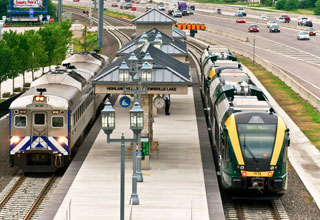CM/GC Emerges as a Non-Traditional Procurement Alternative in the Transit Industry (Source: Mass Transit)
Transit agencies are increasingly pursuing alternatives to traditional low-bid procurement to build projects rapidly and more cost-effectively. One non-traditional procurement that is emerging as a trend in the transit industry is Construction Manager/General Contractor (CM/GC). Although this procurement method has been used in vertical construction projects for many years, it is still not as common in the transit industry and is starting to gain traction.
The CM/GC process is divided into two phases, a pre-construction phase and a construction phase. The project owner hires the general contractor during the design phase – usually between the 30-60 percent design stage – before the start of construction. This is the pre-construction phase. During this phase, the contractor provides preconstruction services including sub-surface utility engineering, estimating, budgeting, scheduling, value engineering and other design and construction input. Then, the general contractor provides a Guaranteed Maximum Price (GMP) and may be retained to construct the project. Typically, the CM/GC performs part of the work and bids discrete portions of the work to sub-contractors.
In recent years, projects such as Seattle Sound Transit’s East Link, Denton County Transportation Authority’s (DCTA) A-Train, sections of Dallas Area Rapid Transit (DART) light rail and Portland’s Tri-Met have used this delivery method. Los Angeles County Metropolitan Transportation Authority (L.A. Metro) is currently in the process of selecting a CM/GC contractor for its $2.3-billion Link Union Station project (LINK US).
CLICK HERE TO READ COMPLETE STORY

